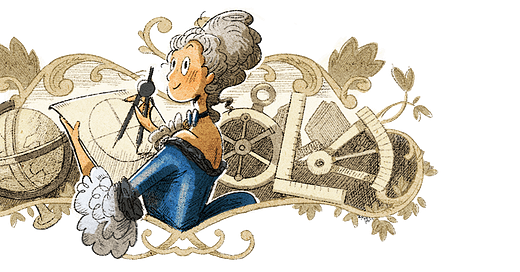
The following post is part of a Seed Pod collaboration about time. Seed Pods are a SmallStack community project designed to help smaller publications lift each other up by publishing and cross-promoting around a common theme. We’re helping each other plant the seeds for growth!
Edge of Yesterday celebrates the 318th birthday of French mathematician, physicist, translator, and philosopher Émilie du Châtelet, whose contributions to Newtonian theory and mission to make scientific literature more accessible helped clear the path for modern physics.
The Marquise is the subject of Find Me in the Time Before, the fourth book in the Edge of Yesterday time-travel adventure series. In doing research for the book, I stalked Madame du Châtelet through France, from her natal home in a tony section of Paris to the idyllic setting of her château in Cirey, along with her husband the Marquis, and her lover, science lab-, writing-, and sparring-partner, Francois-Marie Arouet, a.k.a., Voltaire. Together, they built one of the largest libraries in Europe, and assembled the most up-to-date science laboratory in France.
To entertain their friends—some of the greatest minds of the Enlightenment, who came to visit their salon and often stayed months at a time—and to stage Voltaire’s plays, Émilie had constructed a “little theatre” on the top floor of the château.
This amazing polymath, lauded1 as "the daring genius of the Enlightenment,” according to one of her biographers, is near and dear to my heart.2
Émilie du Châtelet was born Gabrielle-Émilie Le Tonnelier de Breteuil in Paris on this day in 1706. Raised in an aristocratic household, du Châtelet learned avidly from the distinguished scientists and mathematicians who found their way to her father’s home in Paris and at Versailles. When her father lost his job as chief diplomat to King Louis XIV and the family’s source of income, she paid to supplement her formal math and science studies by gambling at Court in fencing and winning at cards. Thanks to her earnings, she could continue her lessons, including in languages. She learned six languages by the age of 12.
Despite society’s discouragement of women pursuing the sciences, Emilie du Châtelet broke convention. The Marquise’s magnum opus appeared in 1740 with the anonymous publication of “The Foundations of Physics,” a work of natural philosophy that married Newtonian physics with metaphysics. Her work played an instrumental role in the acceptance of Newton’s “Principia” across Europe.
Albeit anonymously, la Marquise du Châtelet continued to revolutionize physics by translating “Principia,” Newton’s manifesto for the laws of motion and gravity. Published after her untimely death in childbirth in 1749, hers remains the leading French translation to this day.

After her death, she was entombed in a beautiful Baroque Catholic church in Lunéville, France. There is no recognition of who lies beneath the ground. The black stone is blank; it doesn’t even show her name. This brilliant woman, controversial in her own day—and under-recognized in ours, deserves our attentions and accolades for her pathbreaking accomplishments in science, mathematics and philosophy at a time when women, even noblewomen, were considered their husbands’ property.
Read an interview with this “daring woman of the Enlightenment” at the Edge of Yesterday, and check out the newest book in the Edge of Yesterday pantheon featuring the Marquise, Voltaire and modern teen STEAMinista Charley Morton in Find Me in the Time Before.
Joyeux anniversaire, Émilie! Here’s to an unstoppable force in the progression of physics!
Want to see more posts from this Seed Pod or join in on the fun? Head over to our roundup to learn more!
Emilie du Chatelet: Daring Genius of the Enlightenment, by Judith P. Zinsser, Penguin reprint, 2007.
Check out this interview between the Marquise and my time-traveling teen protagonist Charley for an up-close-and-personal view of Émilie’s accomplishments, and the drama surrounding her life. https://edgeofyesterday.com/time-travelers/discover/heroes/emilie-du-chatelet





